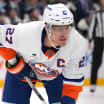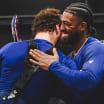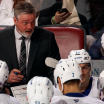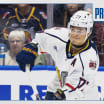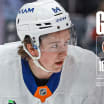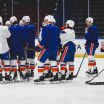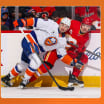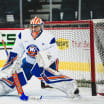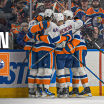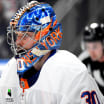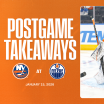"The miracles we do immediately, the impossible takes a little longer" - U.S. Armed Forces Slogan
Considering Kelly Hrudey's goaltending career, that could have been his slogan as well.
After all, Hrudey was in goal April 18-19, 1987, making 73 saves as the Islanders beat Washington in the playoffs. The "Easter Epic."
Maven's Memories: Kelly Hrudey's Road to the Islanders
Stan Fischler chronicles Kelly Hrudey's path from learning to skate at age 11 to making the NHL
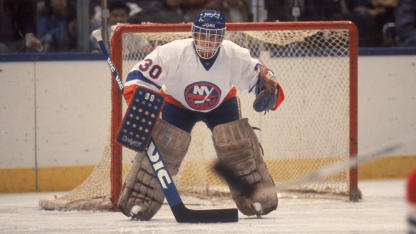
© B Bennett/Getty Images
By
Stan Fischler
Special to NHL.com
It was the longest Game Seven in history, spanning four overtime periods. The Hockey News rated it "One of the greatest games ever played -- all-time."
Yet if you consider Kelly Hrudey's hockey roots, it was a miracle of sorts that he ever made it to the NHL. The impossible Easter Epic just took a little longer. Looking backward, here's why:
If you want to make the NHL, scouts suggest that it's a good idea to start skating at about age four, or five, or, at the latest, six.
Wait until 11? Forget about it.
Unless, however, your name is Kelly Hrudey.
"I was 11 before I even asked my dad about playing hockey," the former Islanders goaltender revealed.
Kelly's father had a good laugh and then shot back: "Okay, but first you have to spend a year learning how to skate."
This was in Edmonton, Alberta, where everybody loved hockey -- still do -- including Kelly and his older brother, Ken.
ALUMNI CORNER: KELLY HRUDEY
The thing was that the Hrudey Brothers version of the ice game was not played on ice but rather in the driveway or the family basement. They used a ball instead of a puck.
"Ken and I spent hours in our basement playing ball hockey," Kelly recalled. "I had trading cards -- all the Maple Leafs and Canadiens. Guys like Jean Beliveau of Montreal were my idols."
Their parents, Steve and Pauline, fancied themselves NHL aficionados and bonded with the boys when they watched "Hockey Night In Canada" telecasts. "On Saturday nights I was glued to the TV games," Kelly said.
Kelly is the first to admit that he and Ken enjoyed the good life as kids.
Their dad worked for Prairie Rose Bottling and regularly would import one of the firm's Orange Crush syrup for family consumption.
"Dad would dilute it with tap water and it was delicious. Ken and I would have drunk it morning, noon and night but mom restricted us to one pop every night."
In his autobiography, "Calling The Shots," by Kelly with Kirstie McLellan Day (HarperCollins, 2017), Kelly points out that he, his brother and parents comprised "a very close family and we did everything together."
When Kelly finally got around to wanting to join a hockey team, Steve Hrudey recommended a year of skating lessons and Kelly obliged. By the time he hit the 12-year-old mark, Kelly was ready for a neighborhood team.
"The good news," he remembered, "is that I was an athletic kid. I was good at all sports. In elementary school I was voted 'The Best Athlete' The only sport I didn't play was basketball.
"The bad news was that -- at least in the beginning -- I was lousy at hockey as well. The difference being that I loved hockey as opposed to shooting hoops; which wasn't for me."
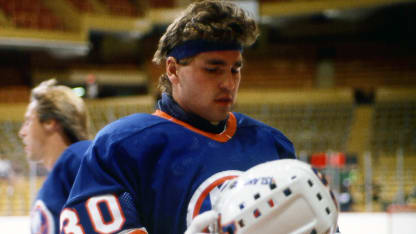
© Steve Babineau/Getty Images
Despite his goaltending passion and willingness to learn, Kelly flubbed his attempts at the community-league level as well as Pee-wee C and Bantam C.
Nevertheless, he trained all his resources on the puck-stopping at hand and finally got a break. His Edmonton buddy, Clint Malarchuk, graduated from the local Peewee A team, thus creating an opening for Kelly.
(Editor's Note: Malarchuk would move on to a successful NHL career. It was punctuated by a horrendous accident when a foe's skate sliced Clint's jugular vein and the goalie nearly bled to death.)
Replacing Malarchuk proved a turning point in Kelly's career. His game exponentially improved by the month on the team -- Canadian Athletic Club Inland Cement. Hrudey now was serious about puck-stopping.
He became even more intense when Al Lymer took over the bench. Lymer introduced pro-type workouts including anaerobic fitness. Relentlessly the team reached the Alberta Provincial championship.
Kelly's opposite in Calgary's goal was Mike Vernon who later would be a Stanley Cup-winner with the Calgary Flames and Detroit Red Wings.
Hrudey: "The whole time we played them I kept thinking, 'Wow, that Vernon guy is amazing.' I never would have dreamed that we'd wind up playing against each other in Junior hockey and then again in the pros.
"Finally, we wound up as teammates, playing together in San Jose with the Sharks. I mean, what are the odds for something like that to happen?"
Kelly's confidence climbed another notch when his Edmonton sextet vanquished Vernon's Calgary's outfit in a two-game total goal series.
A few weeks later Hrudey's self-assurance meter climbed a few more degrees. Big-time Junior A teams in the Canadian West not only had discovered him, they wanted him on their side.
The temptations were tearing him apart. His decision finally came down to either the Bruins of New Westminster, British Columbia or the Tigers of Medicine Hat, Alberta.
"I found about their interest in the mail," Kelly recalled. "I got letters from both teams inviting me to their training camps. So, I had another important decision to make.
"The Bruins were a really good team. On the other hand the Tigers were weak. I figured I'd have a better chance of making the Medicine Hat lineup. Another key factor in my decision was that The Hat was closer to home."
By this time Hrudey had been around the ice game long enough to realize that he could make a living out of battling a six-ounce vulcanized hunk of rubber. Suddenly, the NHL appeared in Kelly's telescope.
MAVEN'S MEMORIES
WRITTEN COVERAGE
How The Trio Grande Happened
Chico Resch's Unforgettable Game
Denis Potvin's Road to the Isles
Ziggy Palffy, Underrated Islanders Hero
Bill Torrey's Origin Story
The Heals and Flats Show
1993 Run Ends in Montreal
Unusual Draft of 1979
Isles Upset Pens in 1993
Maven's Haven
Medicine Hat reached an Eastern Conference Final one season with Hrudey in goal and had designs on the Memorial Cup (Canadian Junior championship) another year.
One of Kelly's frequent foes -- and a future Islanders teammate -- was Brent Sutter of the Lethbridge (Alberta) Broncos. Other future NHLers on Lethbridge were the Sutter twins, Ron and Rich, plus Randy Moller.
Hrudey: "There were nights I was stopping 50 to 60 shots and a lot of them came from Brent Sutter's stick. He put up 108 points that season."
In his autobiography, Kelly emphasizes the value of superior coaching as well as the debits of absentee mentors.
Hrudey wasted no words ripping Patty Ginnell, who once had a terrific rep when leading the Flin Elon Bombers, but became distant from his Tigers team.
Ironically, one "lesson" Ginnell taught was to nix the post-tourney handshake. What's surprising to some is that Kelly -- such a pleasant gentleman off the ice -- belonged to the "No Shake" bloc.
"The problem with the handshake," Hrudey explained in his memoirs, "is that it was not in the spirit of how I played the game. I played in a state of hate.
"I didn't just dislike my opponents, I hated each and every one of them. Two minutes after the final horn sounded that hatred of mine hadn't gone away. It took a little longer than that."
By this time big-league scouts were keeping an Argus eye on Kelly. The Rue de Rumeur was filled with whispers that he just might be drafted by an NHL team. At first he shrugged off the rumors as idle gossip.
Then, along came the June 1980 Entry Draft, not long after the Islanders had captured their first Stanley Cup. One hockey magazine listed Hrudey as "one of the goalies who might be plucked by an NHL team."
The others included Don Beaupre, Rick LaFerriere and Darrel May. Although Kelly was pleasantly surprised he did not attend the Entry Draft in Montreal because he never figured to be picked in the first round.
Instead, he remained home, playing ball hockey with his brother, Ken. Surprisingly, the Entry Draft was the farthest thing from his mind.
Then, RRRIINGG! It was 1:30 p.m. in Edmonton when the phone call came from Montreal. Kelly ran up from the basement and grabbed the receiver.
The voice on the other end belonged to Jimmy Devellano, co-architect with Bill Torrey on the Cup-champion Islanders. Jimmy D was Bow Tie Bill's premier scout. He had news for Hrudey:
"I'd like to let you know that we drafted you in the Second Round," Devellano intoned.
Jimmy D also explained that he originally planned to wait until the third round before picking Kelly.
Devellano: "We were caught off guard when Minnesota (North Stars) chose Don Beaupre with their second pick (37th overall). They were one ahead of us. We picked Kelly next."
In his own autobiography, "The Road To Hockeytown," Devellano allowed that the two best goaltenders he ever drafted, all-time, were Chris Osgood and Hrudey.
Once Kelly had digested Devellano's message, and thanked Jimmy D for the news, Hrudey joyously skipped down the basement steps and returned to the floor hockey game with Brother Ken.
According to Kelly's autobio, their conversation went like this:
Kelly: "I just got drafted by the New York Islanders!"
Ken: "Cool!"
At that point their ball hockey game resumed.
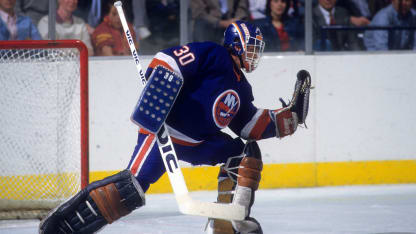
© B Bennett/Getty Images
As did Kelly's hockey career; only better than before. His resume was growing longer and more impressive than ever.
In his last Junior season, 1980-81, he was runner-up to Grant Fuhr as First Team WHL All-Stat goalie. From there he graduated to the Islanders Central Hockey League franchise, the Indianapolis Checkers.
As a first-year pro, Hrudey had some things to write home about: his Checkers won the CHL title, Kelly was playoff MVP and he made the league's First All-Star Team.
Ditto for the next year: League MVP, champ team and First All-Star Team.
Kelly's eyes now were riveted on the NHL and his parent club, the Islanders.
There were two meaningful road blocks: 1. Future Hall of Fame goalie, Bill Smith and, 2. Battlin' Billy's competent back-up, Rollie (The Goalie) Melanson.
To everyone's surprise, Torrey chose to break from tradition. He added Hrudey to his roster, giving the Isles three goalies. Once gave Kelly the news he had made the Isles, Hrudey went a bit nuts outside his hotel.
Hrudey: "I was like Sylvester Stallone in 'Rocky' where he's running up the stairs. I raised my arms in the air and just flew down the steps. I was beside myself with joy!"
And that's how a lad who couldn't skate until he was 12 years old became the hero of "The Easter Epic," one of the NHL's greatest games.
Kelly Hrudey earned the somewhat amended theme,
The miracle he did almost immediately; the impossible took him a little longer.



